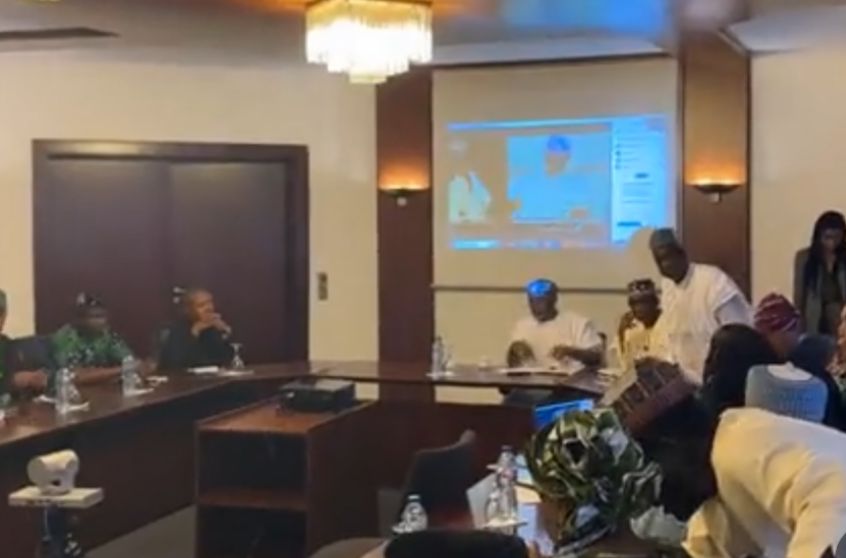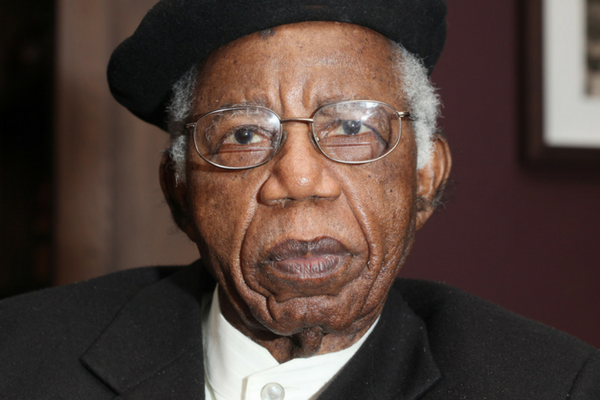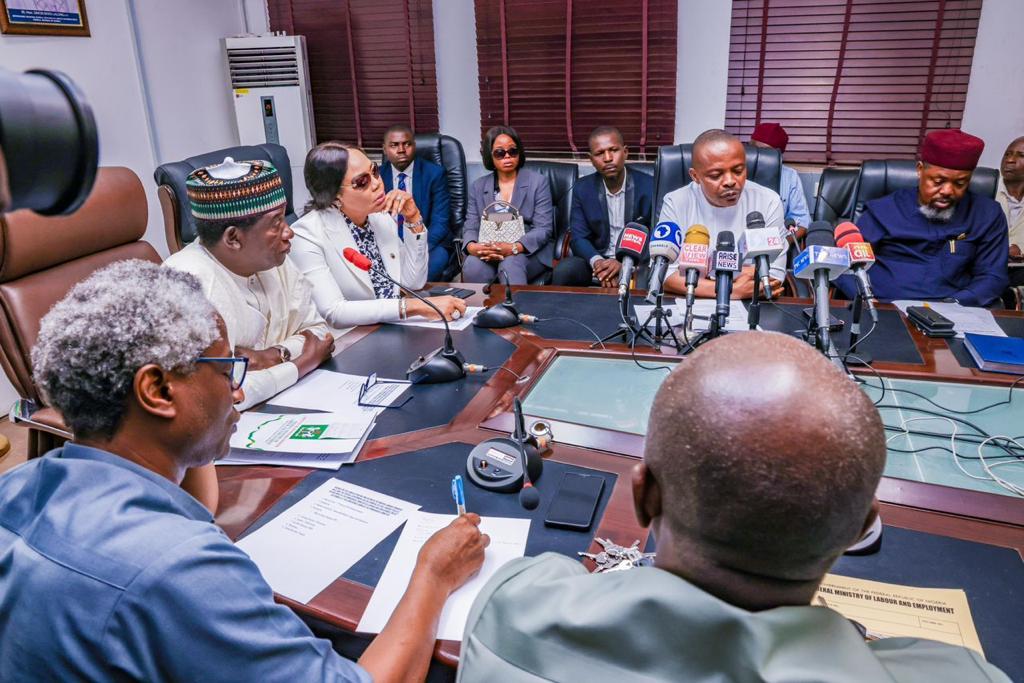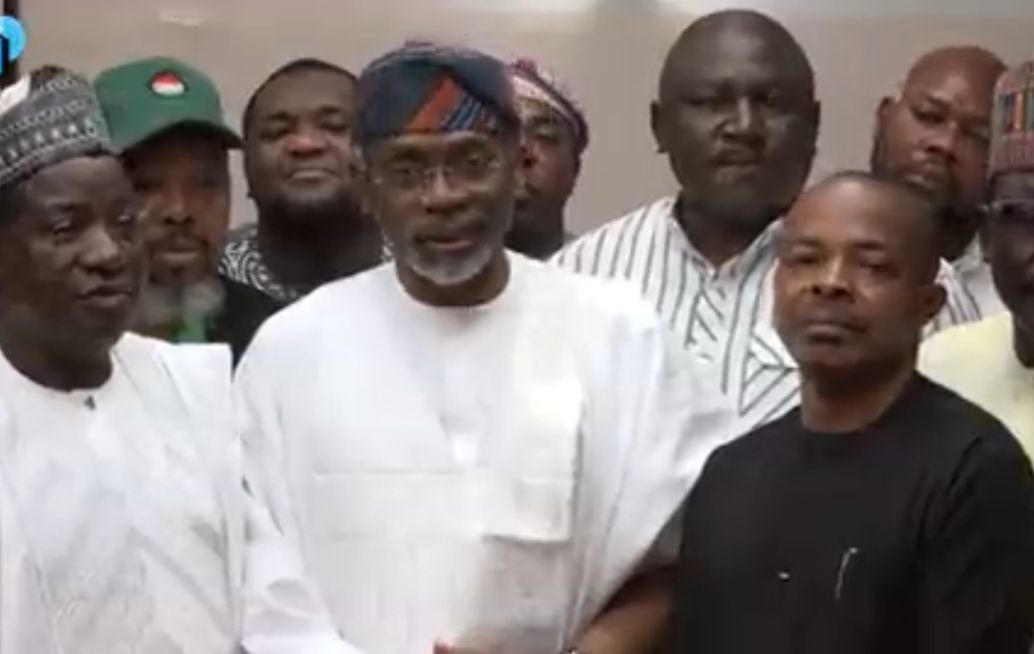Man beaten up, stripped in Lagos — weeks after proposed crossdressing ban
In September 2018, Nicholas Okoh, the leader of the Church of Nigeria (Anglican Communion), said homosexuality is hindering the nation’s progress. Speaking to millions of Nigerians, he said it is an “unlawful act fed by the disintegration of social values and cultures”.
Okoh is not alone. In Nigeria, a majority of lawmakers, preachers, and religious scholars share similar views; those who identify as gay are regarded as sinners who defy the natural order, Biblical tenets, and Islamic law.
This is the motivation behind Nigeria’s stance when, in January 2014, the country did not mind facing the wrath of the United States and the Western world, against a plea-turned-warning from the United States, Nigeria went ahead to pass the same-sex marriage (prohibition) bill into law. While the bill was in deliberation, Baba-Ahmed Yusuf Datti, who recently ran for office in 2023 as running mate to the Labour Party’s presidential flagbearer, said: “Such elements (homosexuals) in society should be killed”.
The law, which was supported by a majority of the members of the national assembly, Nigeria’s parliament, signed by former President Goodluck Jonathan, prescribed a 14-year prison sentence for anyone caught entering into a same-sex marriage contract or civil union.
Advertisement
The law also banned the operation of gay clubs, societies, and organisations including anyone who supports them – such violation will attract a 10-year prison sentence. The law also voided all pre-2014 gay marriages or civil unions by Nigerians — done in a foreign country.
THE YAN DAUDU EXISTED BEFORE “HOMOSEXUALS”
Long before the word “homosexual” was coined by German translator Karl Maria Kertbeny in the 1860s, Yan Daudu, effeminate men, existed in Nigeria. In northern Nigeria, this group of people predate Islam and Christianity in Nigeria, talk, dress, and act “like women”.
Advertisement
The Yan Daudu are said to be found around brothels, where they entertain male clients and oftentimes work as cooks in local restaurants. They also work as either pimps or sexual workers. Although Yan Daudu are often feminine-presenting men who sometimes engage in sex work, not all of them identify as homosexuals. Some are said to be cross-dressers who act as go-betweens male clients and sex workers.
Historically, the Yan Daudu found acceptance within the Bori cult — a traditional Hausa religion that is said to predate the Islamic faith of the Hausa people in northern Nigeria.
The Bori cult served as a haven for people who did not fit into normal society’s stratification. At that time, Yan Daudu was seen as part of the society and was never persecuted.
However, since the advent of the Islamic religion in the country, they are no longer tolerated, and with the adoption of the Sharia law, they have become more vulnerable to attacks and harassment.
Advertisement
In April 2022, Muda Lawal, a lawmaker representing the Toro federal constituency of Bauchi state, sponsored a bill to prohibit cross-dressing. The legislation sought to add two new sub-clauses to section 4 of the existing act.
It passed its first reading at the lower legislative chamber but since then no further legislative work has been done on it.
PERSECUTION OF LGBTQ+ PEOPLE
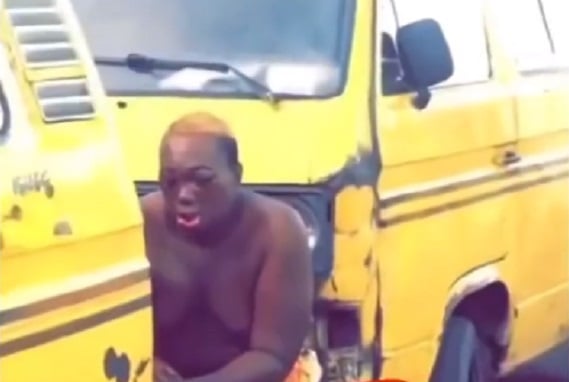
Although the punitive sentences are hardly enforced, the anti-gay law has somewhat given free rein to people to perpetuate widespread intimidation and violence against the LGBTQ+ community.
Advertisement
Media reports and human rights organisations interviews have shown that the level of harassment worsened after the law was enacted while perpetrators were rarely held accountable.
In recent years, the government has raided and shut down events associated with gay persons. One such prominent case was the planned birthday party of Okuneye Idris Olarenwaju, a self-acclaimed Nigerian transgender and cross-dresser, in 2019.
Advertisement
Olanrewaju, popularly known as Bobrisky, was planning her 28th birthday party. Zubairu Muazu, the then Lagos commissioner of police, ordered the deployment of over 100 police officers to prevent a potential “breach of public peace” ahead of the birthday party.
The deployment was “to ensure that no immoral act took place on the premises of the party”.
Advertisement
Commenting on the incident, Olusegun Runsewe, Nigeria’s Director-general of the National Council for Arts and Culture (NCAC), called Bobrisky, a national disaster that poses a severe hazard to Nigerian youths.
In July 2022, a Sharia court in Ningi LGA of Bauchi sentenced three men to death by stoning after convicting them on charges of engaging in homosexuality. – they were convicted based on provision 134 of the Bauchi state penal law. There have also been reported cases where individuals are publicly flogged or attacked for dressing a certain way.
Advertisement
Last December, the Kano Hisbah board arrested 19 youths for allegedly attending a gay wedding ceremony in the state. There have been other similar cases of raids and arrests. The reports can be found here.
ANTI-GAY SENTIMENTS ARE ALSO RIFE ON SOCIAL MEDIA
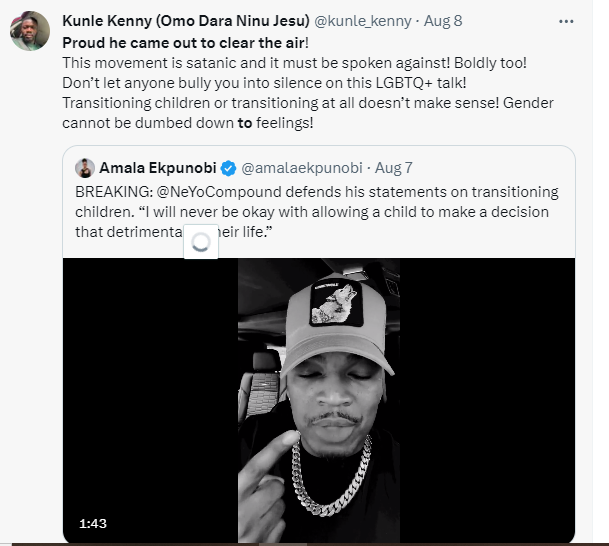
Screenshot of one such anti-gay post
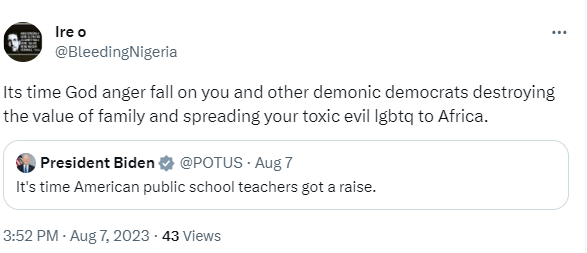
‘I WAS TOLD I WAS POSSESSED BY A DIRTY SPIRIT’
There is a raging phenomenon known as conversion therapy, where families use religion to blackmail loved ones who are gay into changing their sexual orientation
Craig, who resides in Lagos, told TheCable that his sister took him to a church for “deliverance” and tried to alienate him from his queer friends.
The pastor at the church said he was possessed by a dirty spirit and made him pray and fast before deliverance sessions. Craig said though he never believed what the pastor said, he fasted just to satisfy his sister.
“I was shamed and rejected by two of my sisters and suffered harassment at the hands of a former employer,” Craig said.
“I was living with my sister then and had just finished writing JAMB. And since my sister was someone I really liked a lot, I thought she would understand. On my Facebook, I usually share a lot of queer stuff, so she sent me a request. My account was private and I don’t have family as friends, so I accepted only her. She started seeing what I was posting and became uncomfortable.
“There was a time my eldest sister came around and she told her she wasn’t comfortable with me being around her son. I felt really bad because there’s a difference between being a queer and a paedophile. So, I had to leave her place.”
Craig would later move in with another older sibling who lives in Zaria with her family. She enrolled him for a diploma at Ahmadu Bello University, but things worsened while living with her.
“I was always going for deliverance, every week, fasting like four times a week, and then I had to go to church every evening once I closed from school,” Craig added.
“The pastor said it is one demonic spirit that is smelling that has possessed queer people. I don’t believe in all that. Whenever it is time for deliverance, the pastor will put olive oil on my head, pray, and be pushing me.”
“Well, that also did not work,” he scoffed.
Craig also had to leave for the hostel because he was being maltreated and was at the end of his tether. “It was really crazy. I couldn’t go out. She collected all my clothes and burnt them. I like fitted clothes. I had four carryovers in school. That was like the deal breaker. I was depressed. I didn’t have freedom; I couldn’t come to the living room to sit, I had to be in my room. I couldn’t go into the kitchen, if I had to come out, I would have to call. My phone was even seized.”
FORCING GAY MEN INTO HETEROSEXUAL MARRIAGES
Several gay men in Nigeria have been forced into heterosexual marriages to conform to society’s expectations and avoid suspicion and arrest.
For Ola, since he came out a year ago, his sexual identity has been a battle between him and his family, who find it hard to wrap their heads around his queerness.
“I’ve had my family discriminate against me, look down on my partner, and openly criticise my lifestyle choices. They have employed religion as a tool against me and continue to push me to get married even though I will be 25 in some months. It’s really been intense, this last year. Religion has also been used as a tool for emotional blackmailing,” Ola said.
Luckily for him, he was not taken to church for deliverance, however, he occasionally gets battered with scriptures from the Bible to make him realise his sinful disposition.
“I was told that God made Adam and Eve, not Adam and Steve. It hurt, but I pushed it aside and moved on,” he said with a grimace.
Aminu, who lives in northern Nigeria, had to part with some amount of money to regain his freedom when he was wrongfully accused of rape.
He said a fellow queer had reported him to the police and accused him of rape because of a misunderstanding – the fact that he was gay made it worse.
“I have been assaulted by the police for my sexuality. This happened last year after a former lover outed me and took me to the police with a false accusation rape. My family rallied together and helped me as best they could. I was detained for three days and was only released after my family forked off money, so I guess you can say there was also extortion there,” Aminu said.
NIGERIA ANTI-GAY LAW VIOLATES THE COUNTRY’S CONSTITUTION
Nigeria’s anti-gay law violates the Nigerian constitution and several human rights treaties/International charters that Nigeria is a signatory to.
The law guarantees freedom of association, which the anti-gay law impedes. Some international treaties violated by this law include the African Charter on Human and Peoples’ Rights (ACHPR) and the Universal Declaration of Human Rights (UDHR).
| Treaty | What it says |
|---|---|
| Article 2, African Charter on Human and Peoples Rights (ACHPR) | Every individual shall be entitled to the enjoyment to the rights and freedom recognised and guaranteed in the present charter without distinction of any kind such as race, ethnic group, colour, sex, language, religion, political or any other option, national and social origin, fortune, birth or other status. |
| Article 1, Universal Declaration of Human Rights (UDHR) | All human beings are born free and equal in dignity and rights. They are endowed with reason and conscience and should act towards one another in a spirit of brotherhood. |
| Article 7, Universal Declaration of Human Rights (UDHR) | All are equal before the law and are entitled without any discrimination to equal protection of the law. All are entitled to equal protection against any discrimination in violation of this Declaration and against any incitement to such discrimination. |
| Article 9, Universal Declaration of Human Rights (UDHR) | No one shall be subjected to arbitrary arrest, detention or exile. |
Damola Bolaji, advocacy and communications officer of the Initiative For Equal Rights (TIERs) said: “The law has become a tool being used by some police officers and members of the public to legitimize multiple human rights violations perpetrated against LGBT people.
“You are walking on the street, and once they recognise you, they start harassing you. First, it is verbal and then some people are pulled and manhandled on the road, saying they have the right to do that.
“It is a whole lot of human rights violations. Sometimes, it is cyber-bullying. They threaten you online and call you names. People treat LGBTQ+ people the way they like because of the law.”
She argued that there is no law that says anyone should be charged with homosexuality and that most of the cases recorded are cases of human rights violations.
“What people don’t know is that the SSMPA criminalises the act, not your perception about someone,” she said.
“An example, 57 people were arrested in 2019 even though there was no law that said they should be arrested for attending a party. Like the law emboldens them physically and online.
“So, the only way you can be charged is if you are caught in the act. You cannot raid a party because you heard homosexuals are meeting there.”
She alleged that police officers end up not showing up in the court when it’s time for the proceedings when the case is brought up for hearing.
“On purpose, these police officers did not show up. TIER had to step in to get their bail so they could go back to their houses,” she added.
In December 2019, the US placed Nigeria on its Special Watch List (SWL) for governments that have engaged in or tolerated severe violations of religious freedom.
In December 2020, the US finally designated Nigeria a country of particular concern (CPC) under President Muhammadu Buhari after a spate of killings in the north.
Nigeria was also blacklisted for engaging in “systematic, ongoing, and egregious violations of religious freedom”, but was later removed from the blacklist.
POOR HEALTHCARE AND STIGMATISATION
Although, there are now healthcare centres that cater to the health needs of LGBTQ+ people, health providers still discriminate against them based on their sexual identification. Also, the fear of stigma, verbal harassment, and being outed to the law sometimes makes them shy away from seeking health services.
“Healthcare workers have turned themselves into preachers trying to ‘move sinners’ to the way of the lord,” Ola added.
But unlike others, Ola is lucky to access healthcare without facing stigmatisation because of his network of contacts.
“It’s not unusual to see community members travel from Ekiti and other parts of the country to Lagos to access healthcare. I’ve personally referred some myself,” he said.
The prejudices accompanied by a punitive legal environment for LGBTQ+ people have also sent some to the abyss of mental breakdown.
“The prejudices involved; some people had been kicked out of their houses because they were paraded and it became a huge case. Some people were outed and their families disowned them, Some lost their jobs because of it. They had to be housed in a safe house because when people recognised them in their neighbourhoods, they were getting attacked,” Bolaji said.
“Forced outing, then you are homeless and disowned, you lose your job and of course, there will also be trauma. Those kinds of conditions are like a snowball effect; from homelessness, some people get depressed, some commit suicide.”
NAME-CALLING AT WORK
On the other hand, many have been forced to conceal key aspects of their identity from society and from family, friends, and colleagues.
“I work for an NGO that caters to LGBTQ persons, so work is better. However before I began working in the NGO, I worked in a PR agency,” Ola said
“Here, I often got snide remarks. I quit the job and started working for the LGBTQ community,” he added.
NIGERIA NOT ALONE
Religious intolerance is not peculiar to Nigeria; other African countries like Uganda, Kenya Ghana, and Sudan also have strict anti-gay laws.
Anthony Godonu, a reverend father in Nigeria, said homosexuality is against humanity. He opined that homosexuality cannot be accepted by the church because it is against the natural order.
“I always ask; if someone says they have this orientation, how come the orientation didn’t start from birth? And then, how come you were born through the act of a man and a woman and not through the joining of a man and another man?” Godonu asked.
“If you had not been born through the union of a man and a woman, would you be in existence? They don’t think about that. Common reasoning will tell you that you are not being truthful to yourself but you just want to do what you want.”
Godonu, however, noted that everybody is a child of God but that does not validate “their immoral standard”
On his part, Muhammad bin Uthman, an Islamic cleric, said moral standards cannot be corrupted.
“My moral principle that Islam teaches me is to keep away from anything that has been criminalised by Allah the Almighty. Natural reality will not even allow or condone this aberration called LGBTQ+. It is against even a typical African culture. Go to Uganda, Mozambique… people want their culture upheld… we cannot corrupt it,” Uthman said.
He added that the West should not foist their ways on Africans.
“If we are really independent, we respect our independence, these are red lines we cannot cross. How can we claim we are independent and you want to impose your way of living on me? Have I gone to your own country to impose my own way of living on you? I mean this is negative.
“LGBTQ is aberrational. In Islam, it is totally condemnable, unacceptable, reprehensible, and detestable.”
DECRIMINALISING SAME-SEX ACTS
Human rights organisations have been pushing for the decriminalisation of same-sex acts across the globe. One which Godonu supports. He holds the view that criminalising same-sex acts is wrong.
“They are human beings and everybody should be treated fairly. I believe that they are children of God so you cannot criminalise people based on their sexual orientation,” he said.
“If you criminalise it, then you are saying those who are committing adultery should be arrested and thrown into prison, and of course, you don’t know all those who are committing adultery.
“I don’t know if the civil union we have can be dissolved on the basis of adultery. If that alone is not in the constitution, I don’t think homosexuals should be criminalised.
“Are they harming anybody in society? Are they destroying anybody’s property? Are they affecting the lives of Nigerians in any way? But for me, homosexuals are in the wrong when it comes to morality.”
According to TIERS, a 2019 survey in Nigeria found that only 48 per cent of people supported the country’s anti-gay law, the rest of the people were fine with the law being repealed.
Uthman, however, does not care for how the law treats homosexuals. He is only concerned about safeguarding the culture, and tenets of the Quran.
“I am not in government. I cannot say someone is criminalised or taken to court. That is not my cup of tea,” Uthman said.
“It is my own view to protect my society, my country from an infiltrating decadence, culture that is ungodly.”
This story was produced with the support of the International Centre for Journalists (ICFJ) in partnership with Code for Africa.
